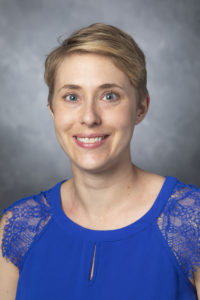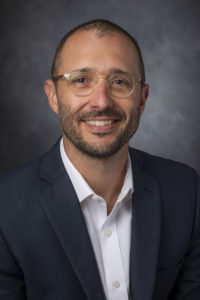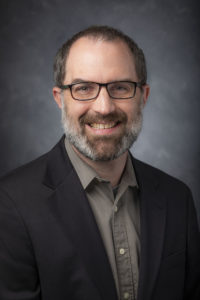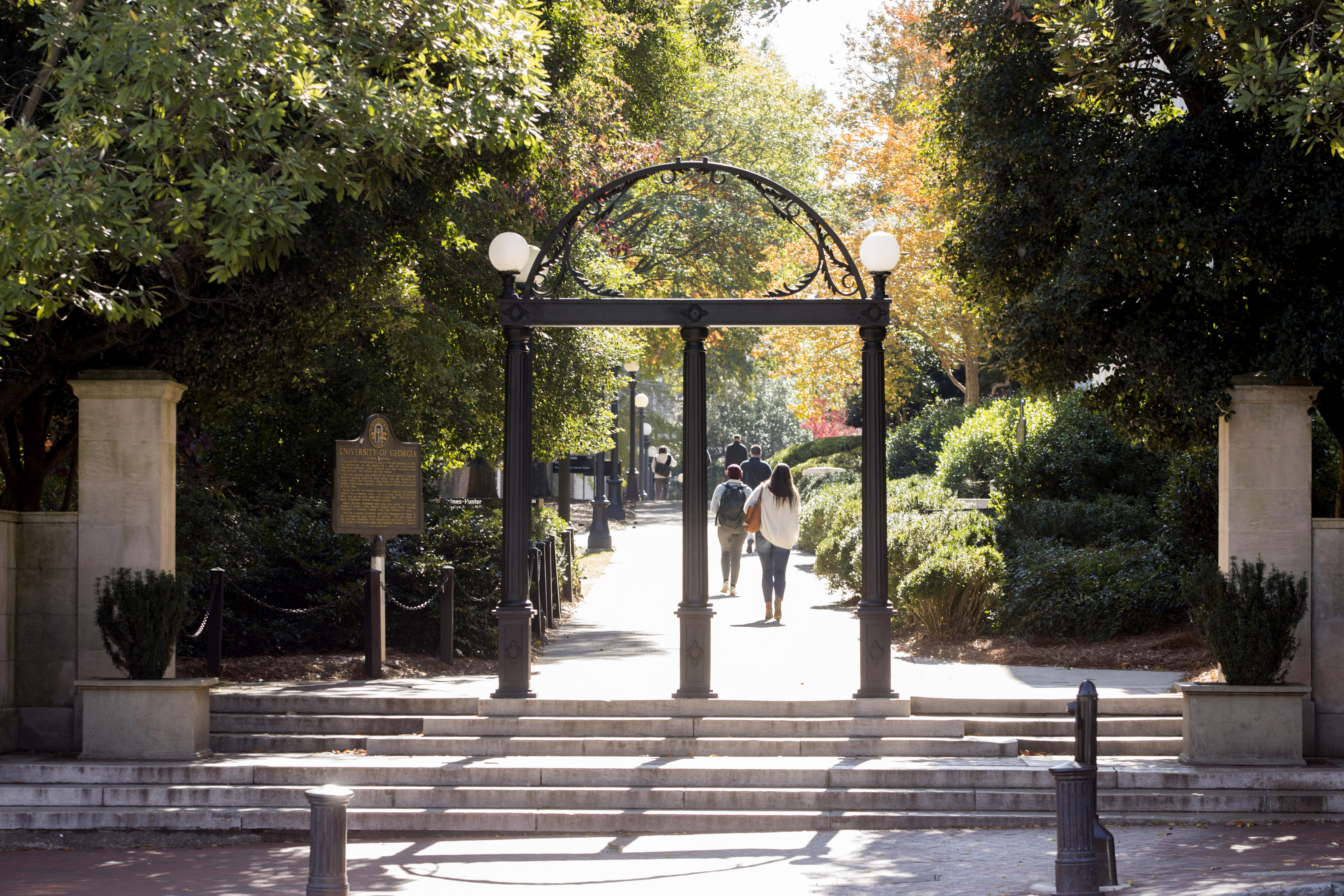Three UGA faculty members received a Richard B. Russell Award for Excellence in Undergraduate Teaching in 2020. Russell Awards recognize outstanding teaching by faculty early in their academic careers. Award recipients receive $10,000. The Richard B. Russell Foundation in Atlanta supports the program.
Tessa Andrews
Associate Professor, Department of Genetics
Franklin College of Arts and Sciences

For Tessa Andrews, promoting deep learning, mentoring students and encouraging research are all part of the teaching process.
“I aim to help students develop deep conceptual understanding of core ideas in biology, hone their ability to think like a scientist, grow as independent learners and appreciate the relevance of biological research to their lives,” she said.
In total, she has taught more than 1,600 students since joining UGA’s faculty in 2013 and has supervised 23 students in their research over 47 semesters.
“First and foremost, she always presented class material in engaging ways, led thought-provoking discussion and guided us in improving our scientific writing,” one former student wrote. “More importantly, her words of advice were always personal and sincere, and she spent time getting to know each student in my class.”
Andrews’ teaching philosophy is guided by a few principles: engaging in challenging cognitive work in class, building scientific thinking skills, using active learning techniques during instruction, minimizing gaps in achievement and classroom experience between those well-represented in STEM fields and those underrepresented in STEM fields, and demonstrating the relevance of the content to students’ own lives.
“I could see the point of every assignment in this class, and I could tell that a great deal of thought went into the planning of the course,” another former student wrote. “I enjoyed the course because of the content, but mostly because of how Dr. Andrews taught it. I loved the use of scientific papers instead of textbooks. It felt way more applicable to real life and made the information easier to apply and remember.”
Andrews has developed evidence-based lessons for teaching natural selection to college students and published these with all of the resources other faculty need to use them. Collectively, these resources have been accessed more than 4,000 times. She also has developed assessment tools that college faculty can use to learn what their students know and what they learn in a course.
Additionally, Andrews is a member of the leadership team for the DeLTA project, a multi-million grant from the National Science Foundation to support the implementation of evidence-based teaching in introductory STEM courses at UGA. As a co-principal investigator on the grant, Andrews studies how thinking and actions relevant to STEM education change among faculty, departments and the administration. This research will yield new insights into how to transform teaching and learning in institutions of higher education. She’s also a founding member of UGA’s Scientists Engaged in Education Research, or SEER, Center.
In 2019, Andrews received a National Science Foundation CAREER Award and the Regents’ Scholarship of Teaching and Learning Award. She was named a USG Teaching and Learning Fellow for Innovative Teaching in 2017, was a UGA Lilly Teaching Fellow from 2014-2016 and a UGA Teaching Academy Fellow from 2013-2014.
“Tessa is a star within the national biology education community,” one colleague wrote. “UGA is fortunate to have an educator of Tessa’s stature.”
—Krista Richmond
Tim Samples
Associate Professor
Department of Insurance, Legal Studies and Real Estate
Terry College of Business

Tim Samples is committed to merging global issues with course concepts in his classroom—and beyond.
“Even when you cannot take the classroom to the world, you can often bring part of the world to the classroom,” he said. “Students are most engaged when they are convinced by connections between global events and foundational concepts in the course.”
Samples has taught more than 1,900 students since joining UGA’s faculty in 2013. One way he’s broadened the horizons for some of those students is by developing two study-abroad courses, including the Business in Cuba course and the Business in South America course, which took place in Chile and Argentina.
“Tim Samples is a fantastic educator who embodies the university’s mission ‘to teach, to serve and to inquire into the nature of things,’ not only through his studies, but also by pushing each of his students to do the same,” one former student wrote.
Additionally, Samples added an experiential component to his International Legal Transactions for Business course with a simulated term sheet negotiation developed as part of his Lilly Fellowship from 2015-2017. The negotiation component of the class allows students to apply their knowledge and the concepts to a realistic international business transaction.
He has twice taught a First-Year Odyssey seminar on “When Countries Go Broke” and is developing another FYO seminar that will explore the intersections of business and geopolitics.
“During my first semester at the University of Georgia, I entered this seminar with little knowledge of finance but a desire to combine my love for politics with the world of business,” another student wrote. “Samples was unlike any professor I have had at UGA as he asked my classmates and me what we were interested in on the first day and tailored our learning of sovereign debt to our interests.”
Samples has mentored four students in their projects for UGA’s Center for Undergraduate Research Opportunities Symposium and has engaged all of them as research assistants on projects outside of CURO.
“His lectures, research guidance and mentorship have been pivotal in shaping my graduate school aspirations and have manifested in a major scholarship and a full-time research position,” one of those students wrote. “I will be forever grateful for his teaching and mentorship. He will have a lasting influence on me and all of the students who have had the fortune to be in his classroom and under his guidance.”
Samples served as a Core Fulbright Scholar in Argentina in 2017-2018, received an outstanding teacher recognition from UGA’s Student Government Association in 2018, was named Terry College’s Outstanding Teacher in 2016 and served as a Teaching Academy Fellow from 2014-2015.
In addition, he’s served as president, vice president and secretary/treasurer in the international section of the Academy of Legal Students in Business and as staff editor and reviewer of the American Business Law Journal.
“Tim is an outstanding professor, scholar and colleague,” one colleague wrote. “He is a role model for life-long learning and the kind of professor that students will long remember after the class ends.”
—Krista Richmond
Gerald Shannon
Assistant Professor
Department of Geography, Franklin College of Arts and Sciences and Department of Financial Planning, Housing and Consumer Economics, College of Family and Consumer Sciences

Gerald Shannon has mapped out his own pedagogical approach to teaching.
He designs authentic, relevant course assignments and research opportunities, emphasizes critical spatial thinking and incorporates active learning and multiple instructional modalities.
“I have a deep commitment to authentic learning, one that comes from a broader background in pragmatist models of education,” he said.
Shannon, who has taught more than 1,800 students since 2013, designed and created a program in community geography. As part of that program, he started the Community Mapping Lab, which gives students the opportunity to collaborate with organizations across the state of Georgia around issues of housing, food and transportation. Rather than completing a pre-designed lab assignment, students must work with both their assignment partner and Shannon to develop a project proposal and collaboratively work together to develop skills and data needed to complete that project.
The Community Mapping Lab also has offered undergraduate research opportunities through UGA’s Center for Undergraduate Research Opportunities. Shannon has supervised 12 undergraduate students on research projects supported by CURO as well as by external grant support.
“Dr. Shannon makes a point to incorporate guest speakers, community service and participation in advocacy work; by doing so, this opens an avenue of learning that the course content goes way farther than just a textbook—it affects the world around us. Also, this method gives students tangible experiences to learn, work and grow,” one former student wrote.
Other active learning techniques remain a significant part of Shannon’s instruction. That can include anything from demonstrations of unmanned aerial vehicles (UAVs or drones) to simulations of algorithms used in big data analytics. Students often play an active role in his courses by generating questions for class discussion and leading regular in-class review sessions.
“Through these and other in-class activities, students actively engage with course material in a variety of ways,” he said.
Additionally, Shannon received a UGA Active Learning Classroom Renovation Grant, which enabled the renovation of two classrooms in the Geography-Geology Building.
“I have observed his teaching, and each time I leave his classroom feeling inspired to add more active learning exercises to my own courses,” one colleague wrote.
His excellence in teaching is evidenced by the receipt of three competitive teaching awards from UGA: the Service-Learning Teaching Excellence Award, the Sandy Beaver Excellence in Teaching Award and the UGA Students’ Career Development Award. He also served as a Teaching Academy Fellow from 2014-2015, a Service Learning Fellow from 2015-2016 and a Lilly Teaching Fellow from 2017-2019.
“He is the professor who taught me to leverage technology to benefit those who need it. He is the friend who always asked how I was doing before we got down to business. He is the mentor who boosted my confidence when I was struggling to learn something new. He is the absolute embodiment of excellence in teaching,” another former student wrote.
—Krista Richmond


